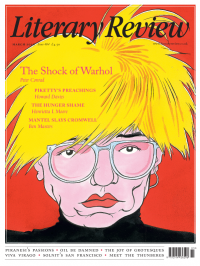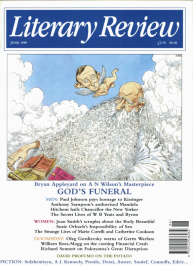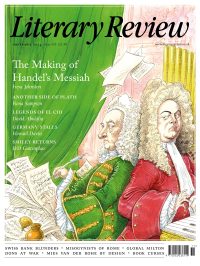February 2025, Issue 537 Ritchie Robertson on W G Sebald * Francis Beckett on miners * Theo Zenou on the Pope * John Adamson on the Civil War * Norma Clarke on pink * Nicholas Rankin on Norman Lewis * Michael Burleigh on Huawei * Robert Gerwarth on the Kaiser's collaboration * Pratinav Anil on missionaries and Mughals * Bijan Omrani on Mesopotamia * Miranda Seymour on the Romanovs * Jason Burke on Saudi Arabia * David Abulafia on the Dead Sea * Claire Harman on Dickens * Tristram Hunt on Marx's Englishman * Stuart Jeffries on immortality * Thomas W Hodgkinson on procrastination * Gillian Tindall on the House of Commons * Paul Genders on Jonathan Meades * Zoe Guttenplan on Michelle de Kretser * Ella Fox-Martens on Eimear McBride * Sam Reynolds on Han Kang * and much, much more…
The Current Issue
Ritchie Robertson
Silent Catastrophes: Essays in Austrian Literature
By W G Sebald (Translated from German by Jo Catling)
Since the deplorably premature death of W G Sebald in a road accident in 2001, Jo Catling, a former colleague of his at the University of East Anglia, has been among the most dedicated keepers of his flame. Her latest tribute to Sebald is a translation in a single volume of his two collections of essays on Austrian literature, Die Beschreibung des Unglücks (‘The Description of Misfortune’) and Unheimliche Heimat (‘Strange Homeland’). Written mostly in the 1980s, these essays preceded the semi-fictional works, culminating in Austerlitz (2001), that made Sebald internationally known. They represent something rare in German but common in English: literary criticism, occupying the space between academic study and journalistic discussion. And they say more, and say it more searchingly, profoundly and pithily, than a cartload of academic monographs. ... read more
More Articles from this Issue
Francis Beckett
Mining Men: Britain’s Last Kings of the Coalface
By Emily P Webber
For two hundred years, Britain needed coal. The men who braved dreadful danger to hew it out of rocks miles underground were considered heroes; their trade union was feared by governments and revered by the rest of the labour movement. In 1984, with brutal suddenness, all this stopped. We found we could do without miners, and so we got rid of them, just like that. Today, forty years on, what miners did, what it cost them to do it and why they thought their way of life was worth fighting for are remembered only by a fast-dwindling group of mining families ... read more
Theo Zenou
Hope: The Autobiography
By Pope Francis (Translated from Italian by Richard Dixon)
Jesus Wept: Seven Popes and the Battle for the Soul of the Catholic Church
By Philip Shenon
The box lay on the table. ‘Everything is in here,’ the man in white said in a thick German accent. ‘I have arrived this far, taken these actions, removed these people,’ he continued, ‘now it’s your turn.’ His interlocutor, also clad in white, listened intently. This isn’t the opening scene of a gangster film. It’s what happened when Pope Francis met with Pope Emeritus Benedict XVI, as related by Francis himself ... read more
Norma Clarke
Pink: The History of a Color
By Michel Pastoureau (Translated from French by Jody Gladding)
Michel Pastoureau began his wonderful and widely translated series on the history of colours with Blue a quarter of a century ago. Black, Green, Red, Yellow and White followed and now here is a history of pink, which may not be ‘a color in its own right’ and for which neither Latin nor ancient Greek has a standard word (it was long regarded as a shade of red). Nevertheless, Pink is as sumptuous as its predecessors, printed on gorgeous glossy paper and written with impassioned scholarship. When Isaac Newton ... read more
John Adamson
Friends in Youth: Choosing Sides in the English Civil War
By Minoo Dinshaw
Early in 1634, two young Middle Temple lawyers helped organise one of the costliest entertainments ever staged before the Whitehall court, a masque celebrating the reign of Charles I entitled The Triumph of Peace. The triumph it saluted proved to be short-lived. Within less than a decade, Charles’s ‘reign of peace’ had imploded and the two amateur impresarios found themselves on opposing sides in the ensuing civil war – Bulstrode Whitelocke (1605–75) as a lukewarm Parliamentarian, Edward Hyde (1609–74) as a reluctant Cavalier ... read more
Michael Burleigh
House of Huawei: Inside the Secret World of China’s Most Powerful Company
By Eva Dou
Founded in 1987, Huawei is one of China’s largest private conglomerates, employing over 200,000 people in 170 countries. It is not the biggest Chinese enterprise – the electric car maker Buy Your Dream has more than 900,000 workers, including 110,000 engineers in research and development. Huawei began as a modest telecoms venture, producing analogue and digital exchange switches for landline systems in a country with a poor phone network. These boxes replaced ranks of usually female switchboard operators of the kind ... read more
Nicholas Rankin
A Quiet Evening: The Travels of Norman Lewis
By John Hatt (ed)
Norman Lewis (1908–2003) was arguably the finest English travel writer of his generation. Other contenders for the title – Robert Byron, Peter Fleming, Graham Greene, Evelyn Waugh, say – were all Oxford-educated, but Lewis was a product of Enfield’s grammar school and its public library. A devotee of the classics – Herodotus, Suetonius, Chekhov, Turgenev – he was attracted southwards. Federico García Lorca was his favourite poet. He gracefully reconfigured his first book, Spanish Adventure, written at twenty-six, into his last book, The Tomb in Seville, at the age of ninety-four ... read more
Most Read
moreRitchie Robertson
Silent Catastrophes: Essays in Austrian Literature
By W G Sebald (Translated from German by Jo Catling)
Norma Clarke
Pink: The History of a Color
By Michel Pastoureau (Translated from French by Jody Gladding)
Claire Harman
Miss Austen
By Gill Hornby
Robert Gerwarth
The Hohenzollerns and the Nazis: A History of Collaboration
By Stephan Malinowski (Translated from German by Jefferson Chase)
Claire Harman
The Letters of Emily Dickinson
By Cristanne Miller & Domhnall Mitchell (edd)
From the Archives
moreFrom the March 2020 issue
Peter Conrad
Warhol: A Life as Art
By Blake Gopnik

From the June 1999 issue
Christopher Hitchens
Some Times in America
By Alexander Chancellor

From the June 1989 issue
Hilary Mantel
What am I Doing Here
By Bruce Chatwin

Back Issues
more
December 2024

November 2024


Sign Up to our newsletter
Receive free articles, highlights from the archive, news, details of prizes, and much more.@Lit_Review
Follow Literary Review on Twitter
Twitter Feed
How to ruin a film - a short guide by @TWHodgkinson:
Thomas W Hodgkinson - There Was No Sorcerer
Thomas W Hodgkinson: There Was No Sorcerer - Box Office Poison: Hollywood’s Story in a Century of Flops by Tim Robey
literaryreview.co.uk
How to ruin a film - a short guide by @TWHodgkinson:
Thomas W Hodgkinson - There Was No Sorcerer
Thomas W Hodgkinson: There Was No Sorcerer - Box Office Poison: Hollywood’s Story in a Century of Flops by Tim Robey
literaryreview.co.uk
Give the gift that lasts all year with a subscription to Literary Review. Save up to 35% on the cover price when you visit us at https://literaryreview.co.uk/subscribe and enter the code 'XMAS24'